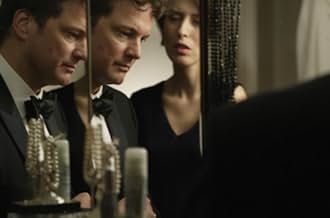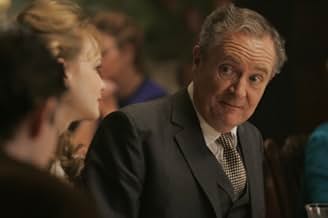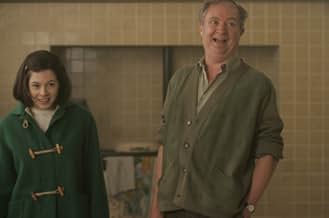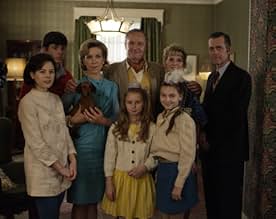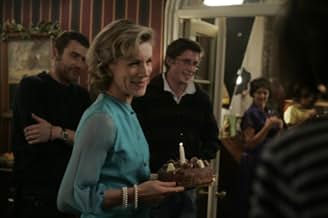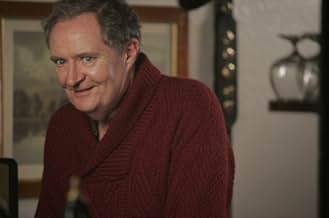IMDb रेटिंग
6.8/10
4.8 हज़ार
आपकी रेटिंग
अपनी भाषा में प्लॉट जोड़ेंThe story of a son's conflicting memories of his dying father.The story of a son's conflicting memories of his dying father.The story of a son's conflicting memories of his dying father.
- पुरस्कार
- 1 जीत और कुल 12 नामांकन
फ़ीचर्ड समीक्षाएं
Reel Inspiration Review: When Did You Last See Your Father.
When Did You Last See Your Father ignores standard Hollywood wisdom: Keep the title short and catchy. Avoid flashbacks. The action should be external, not internal. Make films that appeal to teenage boys. And most of all, don't do stories about old, dying people.
In an article about what sells in Hollywood, an agent moans that she just can't read one more story about coping with aging, dying parents. The market was glutted with them. I couldn't help but think that this must be a very timely and heartfelt theme since it was popping up in so many scripts. Is it possible that there's an adult audience hungry for stories that help them deal with the hard issues in their lives?
When Did You Last See Your Father is based on Blake Morrison's heart wrenchingly honest autobiographical bestseller. It is the story of the forty year old writer's attempts to resolve his troubled relationship with his father as he deals with his immanent death. Collin Firth courageously portrays the estranged son's sometimes unlikable sentiments of resentment, frustration, confusion, and disappointment tinged with compassion for his fading father. Being home brings back memories of coming of age in his charismatic father's shadow and discovering some hard realities about the man. Thanks to Jim Broadbent's dynamic performance, we can see why the son was once proud of him - even though he never felt his father's approval. Blake goes on an internal journey where he finds that he has some of his father's weaknesses. He must decide what kind of man he is to become. At first, the film's lengthy title seems to accuse the grown son of neglecting his father. But by the end, we discover that the title actually asks, "When was the last time you really saw your father - without your own feelings of inadequacy and resentment getting in the picture? When was the last time you saw love?"
Movie Blessings! Jana Segal reelinspiration dot blogspot dot com
When Did You Last See Your Father ignores standard Hollywood wisdom: Keep the title short and catchy. Avoid flashbacks. The action should be external, not internal. Make films that appeal to teenage boys. And most of all, don't do stories about old, dying people.
In an article about what sells in Hollywood, an agent moans that she just can't read one more story about coping with aging, dying parents. The market was glutted with them. I couldn't help but think that this must be a very timely and heartfelt theme since it was popping up in so many scripts. Is it possible that there's an adult audience hungry for stories that help them deal with the hard issues in their lives?
When Did You Last See Your Father is based on Blake Morrison's heart wrenchingly honest autobiographical bestseller. It is the story of the forty year old writer's attempts to resolve his troubled relationship with his father as he deals with his immanent death. Collin Firth courageously portrays the estranged son's sometimes unlikable sentiments of resentment, frustration, confusion, and disappointment tinged with compassion for his fading father. Being home brings back memories of coming of age in his charismatic father's shadow and discovering some hard realities about the man. Thanks to Jim Broadbent's dynamic performance, we can see why the son was once proud of him - even though he never felt his father's approval. Blake goes on an internal journey where he finds that he has some of his father's weaknesses. He must decide what kind of man he is to become. At first, the film's lengthy title seems to accuse the grown son of neglecting his father. But by the end, we discover that the title actually asks, "When was the last time you really saw your father - without your own feelings of inadequacy and resentment getting in the picture? When was the last time you saw love?"
Movie Blessings! Jana Segal reelinspiration dot blogspot dot com
This is a beautifully written, well acted but above all wonderfully directed film looking at a man who learns about himself by finding out about his father. Colin Firth plays a real writer who wrote an auto-biographical novel about his relationship with his father played by Jim Broadbent. It's not a spoiler to say that the father is dying because that diagnosis is given very early on. While the family waits for him to die, events take Firth's memories effortlessly through his past showing him played very well by young actors at 8 and 17.
The events are funny and moving but restrained within a believable reality. Firth learns to live with his father's behaviour as we see that he isn't perfect either. It's positive about life without being sentimental, terrific film.
The events are funny and moving but restrained within a believable reality. Firth learns to live with his father's behaviour as we see that he isn't perfect either. It's positive about life without being sentimental, terrific film.
My last recollection of my father was the look on his face after I placed him in a nursing home in Miami, Florida. Wracked by Parkinson's disease and heart trouble, I was saddened by how far removed he was from the authoritarian and emotionally distant man I feared when I was young, yet a lifetime of resentment could not be entirely forgotten. Indeed, in our society the pressure to love our fathers no matter how awful their behavior is so strong that it often leaves children deeply conflicted. Anand Tucker's And When Did You Last See Your Father? is a film about such conflict, though it does not question the underlying bond of love. Based on the autobiography by British writer Blake Morrison with a screenplay by David Nicholls, the film's title asks the question "when" but seeks an answer that requires more than a date. It asks for the last time in your life when you really saw your father, not as an authority figure but as a complete human being, the complex individual that you may have never seen before.
The film charts the relationship between Doctor Arthur Morrison (Jim Broadbent) and his son Blake (Colin Firth), a writer, over a period of thirty years. As his dad lies dying of cancer, Blake is reminded of their difficult relationship over the years. Using mirrors to suggest there are many different angles with which to view life, Tucker catches events in Blake's life that remain with him and threaten to keep the two apart at a moment when they clearly need each other. Through extensive flashbacks showing Blake as a child, teenager, and adult, the film allows us to understand how events, both small and large, took on mass as the years went by. It makes clear that while Arthur was a devoted father, he was not above being overbearing, deceitful and duplicitous, especially regarding his infidelities with Aunt Beattie (Sarah Lancashire), an open secret in the household, though one that his wife (Juliet Stevenson) came to accept. Stevenson is outstanding in her role of the suffering partner who tries to make up for her husband's aloofness by giving the children her unconditional love.
In flashbacks, we see the eight-year old Blake (Bradley Johnson) seeing his father flaunting the rules by waving his stethoscope to get to the front of a queue waiting to enter a sports event; the fifteen-year-old Blake (Matthew Beard) putting up with his father's whimsy during a camping trip that left them soaked but liberated by driving lessons on the beach, his annoyance when his father, who called him "fathead", walked in on his first sexual awakening with a live-in-maid (Elaine Cassidy). We see the adult Blake (Colin Firth) recalling how his father refused to acknowledge his award of a literary prize at a gala, and then had the tenacity to call writing poetry "not a real job".
And When Did You Last See Your Father is a lyrical tone poem that is marked by brilliant performances. An honest and unsentimental film, it brings dignity to the subject of family relationships and has a powerful conclusion that left much of the audience, including myself, in tears. The best performances are by Matthew Beard as the sensitive but self-righteous adolescent who is hard put to give his father the benefit of the doubt and by Jim Broadbent as the overbearing but loving father. As the final days play out, the quality of Broadbent's performance is such that, while we understand Blake's misgivings, we can still see Arthur as a complex individual with both flaws and virtues. Blake still longs for his father's acceptance and, as his father lay dying, asks him: "It would be good to talk at some point, wouldn't it?" Yet the answer, "What about?" underscores the superficial banter that replaces conversation in many households.
The film charts the relationship between Doctor Arthur Morrison (Jim Broadbent) and his son Blake (Colin Firth), a writer, over a period of thirty years. As his dad lies dying of cancer, Blake is reminded of their difficult relationship over the years. Using mirrors to suggest there are many different angles with which to view life, Tucker catches events in Blake's life that remain with him and threaten to keep the two apart at a moment when they clearly need each other. Through extensive flashbacks showing Blake as a child, teenager, and adult, the film allows us to understand how events, both small and large, took on mass as the years went by. It makes clear that while Arthur was a devoted father, he was not above being overbearing, deceitful and duplicitous, especially regarding his infidelities with Aunt Beattie (Sarah Lancashire), an open secret in the household, though one that his wife (Juliet Stevenson) came to accept. Stevenson is outstanding in her role of the suffering partner who tries to make up for her husband's aloofness by giving the children her unconditional love.
In flashbacks, we see the eight-year old Blake (Bradley Johnson) seeing his father flaunting the rules by waving his stethoscope to get to the front of a queue waiting to enter a sports event; the fifteen-year-old Blake (Matthew Beard) putting up with his father's whimsy during a camping trip that left them soaked but liberated by driving lessons on the beach, his annoyance when his father, who called him "fathead", walked in on his first sexual awakening with a live-in-maid (Elaine Cassidy). We see the adult Blake (Colin Firth) recalling how his father refused to acknowledge his award of a literary prize at a gala, and then had the tenacity to call writing poetry "not a real job".
And When Did You Last See Your Father is a lyrical tone poem that is marked by brilliant performances. An honest and unsentimental film, it brings dignity to the subject of family relationships and has a powerful conclusion that left much of the audience, including myself, in tears. The best performances are by Matthew Beard as the sensitive but self-righteous adolescent who is hard put to give his father the benefit of the doubt and by Jim Broadbent as the overbearing but loving father. As the final days play out, the quality of Broadbent's performance is such that, while we understand Blake's misgivings, we can still see Arthur as a complex individual with both flaws and virtues. Blake still longs for his father's acceptance and, as his father lay dying, asks him: "It would be good to talk at some point, wouldn't it?" Yet the answer, "What about?" underscores the superficial banter that replaces conversation in many households.
The writer Blake Morrison (Colin Firth) has a non-resolved relationship with his bragger and wolf father Arthur Morrison (Jim Broadbent). However, when he is diagnosed with a terminal intestine cancer, Blake leaves his wife and children and travel to the village where he spent his childhood and adolescence to help his mother and his sister to take care of Arthur along his last days. The location brings recollections of his problematic relationship with his father.
"And When Did You Last See Your Father?" is a sensitive movie about father and son problematic relationship. Through the recollections of Blake, the viewer understand the many unresolved situations that made him indifferent (or even hating) his flawed father that loved him indeed. In the end, it dawns on him that his father is gone and he will never see him again; and he grieves and regrets the lost moments he had along his life to stay with him. And you, when did you last see your father? My vote is six.
Title (Brazil): "Quando Você Viu Seu Pai Pela Última Vez?" ("When Did You Last See Your Father?")
"And When Did You Last See Your Father?" is a sensitive movie about father and son problematic relationship. Through the recollections of Blake, the viewer understand the many unresolved situations that made him indifferent (or even hating) his flawed father that loved him indeed. In the end, it dawns on him that his father is gone and he will never see him again; and he grieves and regrets the lost moments he had along his life to stay with him. And you, when did you last see your father? My vote is six.
Title (Brazil): "Quando Você Viu Seu Pai Pela Última Vez?" ("When Did You Last See Your Father?")
After seeing 'When Did You Last See Your Father?', I was reminded that I was relieved that when I lost my Father a scant four years ago, we parted on very good terms. This is a powder keg of a film that manages to spill many tears & hidden truths about a father & son. The story, taken from the true accounts by writer Blake Morrison,is about the love/hate, love/love, hate/hate relationship Morrison shared with his own father, played to perfection by Jim Broadbent (of many a Mike Leigh film). Besides the well written/adapted screenplay,top notch direction & superb acting by the entire cast, I really admired the photography, utilizing light & dark & positioning as a framing device. The films's editing is a sight to behold, too (the way the action cuts back & forth in time over a period of 30 plus years). Hopefully, when Oscar time rolls around next year, 'When Did You Last See Your Father' will be a prime contender for at least a couple of awards.
क्या आपको पता है
- ट्रिवियाMatthew Beard wore brown coloured contact lenses in order to look more like Colin Firth.
- साउंडट्रैकCold Cold Feeling
Written by JM Robinson
Published by EMI Music Publishing Ltd
Performed by T-Bone Walker
Licensed courtesy of EMI Records Ltd
टॉप पसंद
रेटिंग देने के लिए साइन-इन करें और वैयक्तिकृत सुझावों के लिए वॉचलिस्ट करें
- How long is When Did You Last See Your Father??Alexa द्वारा संचालित
- Is this movie based on a book?
- What was going on in the controversial bathtub scene?
विवरण
- रिलीज़ की तारीख़
- कंट्री ऑफ़ ओरिजिन
- आधिकारिक साइटें
- भाषा
- इस रूप में भी जाना जाता है
- When Did You Last See Your Father?
- फ़िल्माने की जगहें
- उत्पादन कंपनियां
- IMDbPro पर और कंपनी क्रेडिट देखें
बॉक्स ऑफ़िस
- बजट
- $80,00,000(अनुमानित)
- US और कनाडा में सकल
- $10,77,273
- US और कनाडा में पहले सप्ताह में कुल कमाई
- $39,210
- 8 जून 2008
- दुनिया भर में सकल
- $27,52,471
- चलने की अवधि1 घंटा 32 मिनट
- रंग
- ध्वनि मिश्रण
- पक्ष अनुपात
- 2.35 : 1
इस पेज में योगदान दें
किसी बदलाव का सुझाव दें या अनुपलब्ध कॉन्टेंट जोड़ें

टॉप गैप
By what name was And When Did You Last See Your Father? (2007) officially released in Canada in English?
जवाब






